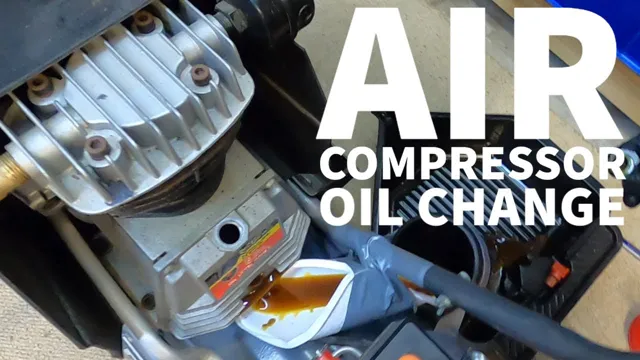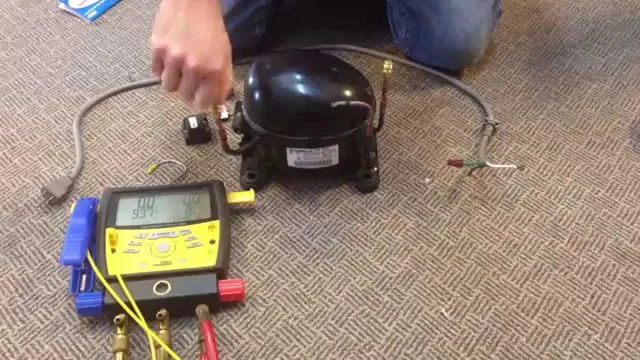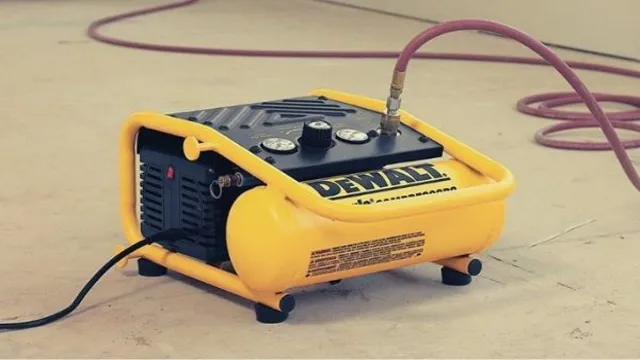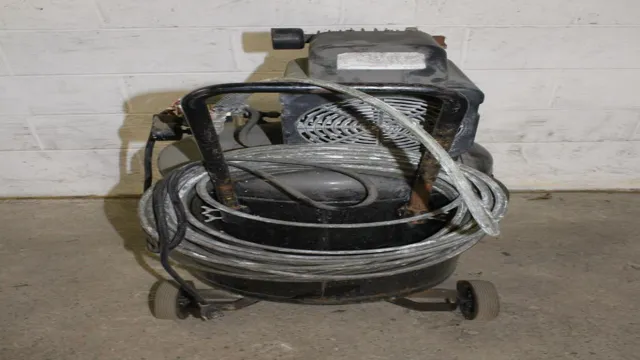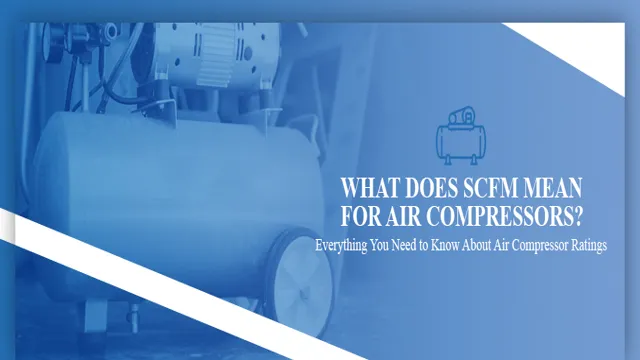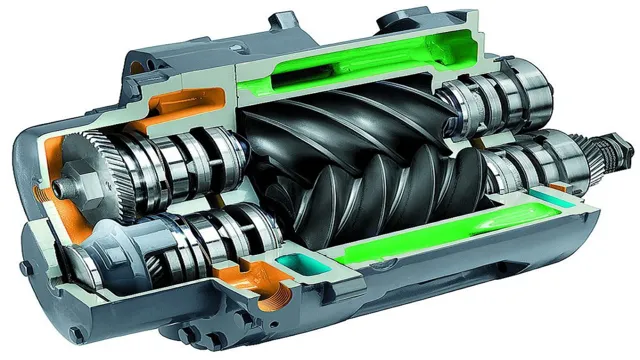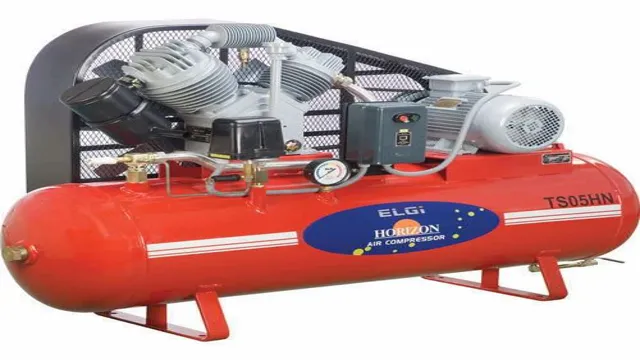How to Make Your Air Compressor Quieter: Top Tips and Tricks for Noise Reduction

Are you starting to feel like your air compressor is getting a bit too loud? If you’ve been working with your air compressor for some time, you’ve probably noticed the noise levels getting louder and louder. Fortunately, there are several tips and tricks you can try to quiet your air compressor. By following these tips, you can not only reduce the noise in your workspace but also extend the lifespan of your compressor.
In this blog, we’ll discuss some of the best methods for reducing air compressor noise levels, including sound-insulated enclosures, vibration pads, and sound-dampening materials. So, let’s jump in and start exploring ways to keep your air compressor running without disrupting your peace and quiet!
Understanding Air Compressor Noise
Air compressor noise can be quite irritating, especially when you’re working in enclosed spaces. Fortunately, there are ways to make your air compressor quieter. One of the easiest ways is to invest in noise-reducing accessories like mufflers or silencers that can be easily attached to the compressor.
Another way to reduce noise is by using vibration pads, which absorb noise and vibrations. Additionally, locating your air compressor in a noise-insulated room can help dampen sound and isolate the noise. Lastly, ensuring proper maintenance of the compressor, such as regular oil changes, and keeping it clean can help reduce noise levels.
By implementing these easy-to-follow tips, you can make your air compressor quieter and enjoy a more peaceful working environment.
Decibel Levels of Common Air Compressors
Air Compressor Noise Air compressors have become a standard equipment in various industries for their ability to provide power to air tools. However, one of the main considerations when choosing an air compressor is the level of noise it generates. The decibel levels of different air compressors can vary greatly, and it is essential to understand the possible impact of loud noise on the workplace and workers.
Usually, the noise level of an air compressor is measured in decibels (dB), with higher decibel levels indicating louder noise. For instance, a small portable air compressor may produce noise levels of around 60 dB, similar to a typical conversation, while large industrial air compressors may generate noise levels of 90 dB or higher, comparable to a chainsaw’s noise. Noise exposure can lead to health issues, such as hearing loss and tinnitus, and it is crucial to choose the right air compressor that provides adequate power but operates at a safe and acceptable noise level.

Causes of Air Compressor Noise
Air compressor noise is a common complaint among users of air compressors. It can be caused by a variety of factors, including the compressor’s build quality, the type of compressor, and the environment in which it is used. Noise can also be caused by the compressor’s motor, which can become worn or damaged over time.
Additionally, air compressors may create noise due to loose belts, worn bearings, or other mechanical issues. To reduce air compressor noise, it is important to regularly maintain the machine and ensure that all parts are in good working order. This can include lubricating bearings, tightening belts, and replacing worn parts.
Choosing a compressor with a lower decibel rating can also help to reduce noise levels while in use, making the machine more tolerable for those who use it regularly.
Ways to Reduce Air Compressor Noise
Is your air compressor making too much noise? Noise pollution can be a big problem, not just for you, but for your neighbors too. Fortunately, there are ways to make your air compressor quieter. First and foremost, you can install a silencer or muffler on the exhaust port.
These reduce the amount of noise that escapes from your compressor by breaking down the sound waves into smaller particles. Additionally, you can insulate the compressor room with acoustic foam or sound-absorbing panels. These materials absorb the sound waves before they have a chance to bounce off of the walls and create echoes.
Another easy fix is to use anti-vibration pads under the compressor to reduce the amount of vibration that is transferred to the floor. By following these tips, you can significantly reduce the noise level and make your air compressor more pleasant to use.
Isolate Your Air Compressor
If you’re bothered by the loud noise produced by your air compressor, there are ways to reduce its noise pollution. One of the best solutions is to isolate the compressor from the surrounding environment. Placing it in a separate room or building can greatly diminish noise levels.
Another option is to simply build an enclosure around the compressor to trap some of the noise. Additionally, make sure to check the compressor’s installation for any loose bolts or connections. Sometimes, these imperfections can cause vibrations that increase the noise level.
Implementing these steps should significantly reduce the noise produced by an air compressor, allowing you to work comfortably without disturbing those around you.
Upgrade to a Quieter Air Compressor
If you’ve ever worked with an air compressor, you know how loud they can be. The constant hissing and buzzing can be distracting, even harmful to your hearing. But there are several ways to reduce air compressor noise and upgrade to a quieter model.
One option is to purchase a soundproofing enclosure, which can reduce noise levels by up to 75%. Another solution is to install acoustic curtains or foam panels around the compressor, which can absorb sound waves and reduce noise. Finally, you can also opt for a newer, more modern air compressor model that uses newer technology to operate at a quieter level.
By taking these steps, you can enjoy a more peaceful work environment while still completing all necessary tasks.
Add Soundproofing Material to Your Compressor Room
If you’re tired of the noise your air compressor produces, you’re not alone. It can be quite frustrating, especially if your compressor is located in a room close to your living space. There are ways to reduce air compressor noise, though, and one of them is adding soundproofing material to your compressor room.
This can include insulation, acoustical panels, and even heavy curtains or blankets. By adding these materials, you can absorb the sound waves that are produced by the compressor and reduce the amount of noise that is heard outside of the room. This can make a significant difference in the level of noise that you experience, making your work and living space much more enjoyable.
So, if you’re tired of the loud noises your compressor makes, consider adding some soundproofing material to your compressor room.
Maintenance Tips to Reduce Noise
If you’re tired of the loud noise coming from your air compressor, there are a few maintenance tips you can follow to reduce the noise. First, make sure that the compressor is properly lubricated. If there isn’t enough oil in the system, it can cause the gears to grind and create excessive noise.
Next, check the air filter to make sure it’s clean. A clogged filter can cause the motor to work harder and create more noise. Lastly, consider installing rubber feet or a soundproofing mat under the compressor to reduce vibrations and noise.
By following these simple maintenance tips, you can make your air compressor quieter and more efficient.
Keep Your Air Compressor Clean
Air Compressor, Maintenance, Noise Reduction Keeping your air compressor clean is essential to prolong its lifespan and ensure proper functioning. Maintenance can be time-consuming, but it’s a crucial aspect of owning an air compressor. One of the best maintenance tips for noise reduction is to keep the compressor clean from debris, dust, and oil.
Dust and debris accumulation can cause the compressor to overwork, leading to excess noise. Regular cleaning of the intake vents, filters, and oil reservoirs can help prevent this issue. Additionally, frequent maintenance of your air compressor’s essential components is essential in reducing noise.
Lubricate the moving parts to prevent friction and clean the air hoses to prevent blockage. Regular maintenance will significantly reduce the noise levels produced by your air compressor and ensure that it works efficiently for a longer time. So, if you want to avoid the annoyance of a noisy compressor, keep it clean, and maintain it regularly.
Replace Worn Out Parts
When it comes to reducing noise and extending the lifespan of your equipment, regular maintenance is essential. One key aspect of this is regularly replacing worn out parts. Over time, parts can become damaged or worn down through use, and this wear and tear can lead to increased noise levels.
By proactively replacing these worn out parts, you can help to reduce noise and improve the overall performance and longevity of your equipment. This can involve anything from replacing belts and bearings to upgrading to more durable materials. By staying on top of these outdated parts, you can keep your equipment running smoothly and prevent costly repairs down the road.
So, the next time you notice your equipment making more noise than usual, take a closer look and see if any parts need to be replaced. Your ears (and your equipment) will thank you!
Conclusion: Better Performance, Less Noise
In conclusion, making your air compressor quieter is no rocket science. With a little bit of ingenuity and some basic knowledge about sound attenuation, you can easily turn your noisy compressor into a purring kitten. Whether it’s by using a sound blanket, building an enclosure, or simply upgrading your compressor’s components, there are plenty of options out there for making your workspace a more peaceful and productive environment.
So don’t put up with that annoying buzz any longer – take matters into your own hands and silence that compressor like a pro! Your ears (and possibly your coworkers) will thank you for it.”
FAQs
What are some common reasons for loud air compressors?
The most common reasons for loud air compressors include worn-out components, air leaks, and incorrect installation.
Can insulation help reduce air compressor noise?
Yes, adding insulation to the walls and ceiling of your compressor room can help reduce noise levels.
What type of muffler should I use to reduce air compressor noise?
A large, high-quality intake muffler can significantly reduce the noise produced by an air compressor.
Is it possible to install a silencer on an air compressor?
Yes, installing a silencer on your air compressor can greatly reduce noise levels.
How does regular maintenance impact air compressor noise?
Regular maintenance of your air compressor can help prevent wear and tear on components, which can reduce noise levels.
Can upgrading my air compressor reduce noise levels?
Yes, upgrading to a larger, more efficient air compressor can help reduce noise levels.
What are some other ways to reduce air compressor noise?
Other ways to reduce air compressor noise include installing vibration pads, using noise-reducing curtains or barriers, and relocating the compressor to a more isolated area.

